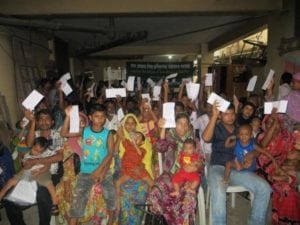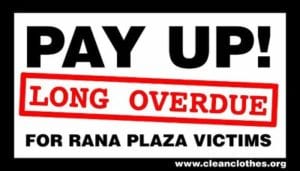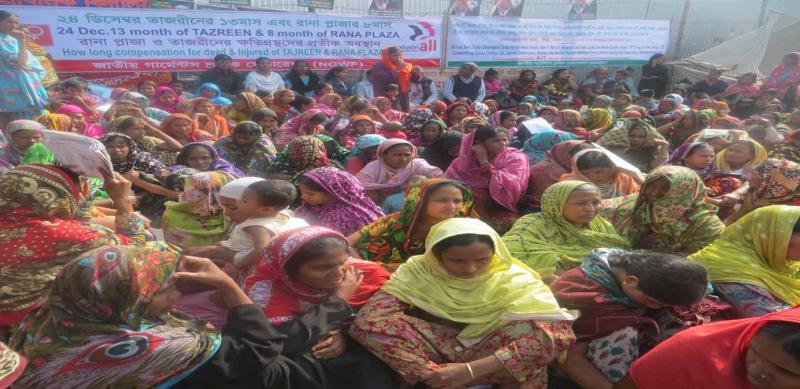 On 29 June 2013, the National Garment Workers Federation hosted 67 children who lost their parents in the Rana Plaza collapse (see below). The children were each given a grant of 2500/- (equivalent to NZD$40.28) by the union and provided with food and transport to the event. The children were also present for a press conference on the International Day of Action to End Death Traps.
On 29 June 2013, the National Garment Workers Federation hosted 67 children who lost their parents in the Rana Plaza collapse (see below). The children were each given a grant of 2500/- (equivalent to NZD$40.28) by the union and provided with food and transport to the event. The children were also present for a press conference on the International Day of Action to End Death Traps.
In the press conference the NGWF noted the growing concern of consumers from developed countries about goods made in unsafe factories and unfair working conditions. In a country with 5,000 garment factories, the safety of 3.6 million people (85% of whom are women) employed in the sector is critical to the Bangladeshi economy. The sector earns 79% of the country’s export earnings. The meeting noted more than 60 transnational companies had signed on to the Accord on Fire and Building Safety in Bangladesh which has union, NGO and retail involvement.
The legally binding accord signed in April 2013 involves an initial inspection of all factories involved for grave hazards and the identification of needed repairs. This will take place within 9 months and an interim procedure has been agreed to deal with urgent remediation measures. A Chief Safety inspector and executive director will be hired and a governance structure set up in Bangladesh. At the press conference the NGWF asked, “How many more children will be left parentless because of unsafe workplaces?”
On July 10 another corporate safety plan for factory workers backed by the GAP and Walmart was launched. It was widely criticised by unions and other groups involved in the sector for not involving workers in governance, the fact that it was not legally binding and did not fund Bangladesh to upgrade its factories.
Lend your support to the Bangladesh workers in their campaign for safer workplaces. Donate now.

 On the second anniversary of the collapse of the Rana Plaza, 24 April, CWS stands with our partners the National Garment Workers Federation of Bangladesh. Today they will organise another human chain made up of clothing workers and families who lost loved ones, were injured or traumatised in this disaster that claimed 1,133 lives. In other parts of the world, activists are organising protests outside Benetton and other shops demanding they contribute to the fund to fully compensate the workers. They are asking companies that do business in Bangladesh to signthe Bangladesh Fire and Building Safety Accord. Find out what companies need to
On the second anniversary of the collapse of the Rana Plaza, 24 April, CWS stands with our partners the National Garment Workers Federation of Bangladesh. Today they will organise another human chain made up of clothing workers and families who lost loved ones, were injured or traumatised in this disaster that claimed 1,133 lives. In other parts of the world, activists are organising protests outside Benetton and other shops demanding they contribute to the fund to fully compensate the workers. They are asking companies that do business in Bangladesh to signthe Bangladesh Fire and Building Safety Accord. Find out what companies need to 
